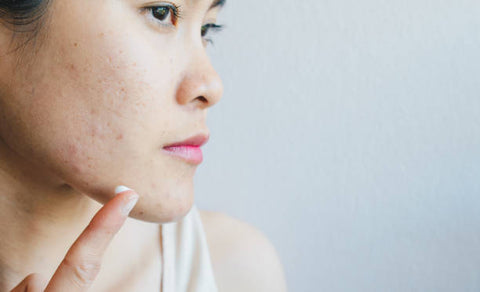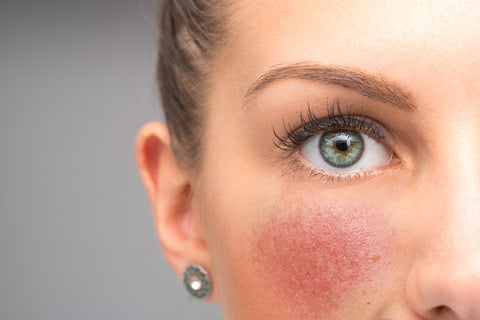Keep Calm and Clear Up

When pimples flare up, you can’t help getting inflamed at the sight of these red and swollen blotches. Often, you just want to hide under the covers and avoid going out in public. But your situation isn’t as hopeless as you think. Acne cases, even severe ones, are treatable. To find the best treatment for inflamed acne, we must understand first what inflammation is and the factors that cause it.
What Is Inflammation?
Inflammation is our body’s natural response to irritants, infections, and injuries. When you sprain your ankle, the area becomes red and swollen. When you badly scrape your knee, the bruised area also becomes inflamed. Even a tiny splinter on your finger causes redness and pain. Why does this happen?
Whenever your tissues get damaged or whenever there’s an irritant, your body’s immune system responds by releasing various substances. Some of these substances cause blood vessels near the affected area to become wider so that more blood can reach the injured tissues. If you recall from science lessons, it’s been taught that blood carries white blood cells and platelets that repair damaged tissues. So naturally, your immune system would want to increase blood flow in that area to hasten the healing process. As this happens, the affected area becomes inflamed, turns red, and feels hot. Sometimes, it might even be painful.
What Is Inflammatory Acne?
In skincare, blemishes that are red and swollen are classified as inflammatory acne. This occurs most commonly on the face but can form anywhere on the body including the back, chest, and shoulders.
Mild cases of inflammatory acne include papules and pustules. Papules are the small red bumps that most people get during breakouts. Pustules are basically the same except for the white or yellow pus in them.
Some inflammatory acne such as nodules and cysts occur deep within the skin and are more severe. Nodules are swollen and painful lumps within the skin. On the other hand, cysts form deeper within and are much redder and more painful.
What Causes Inflammatory Acne?
As mentioned previously, inflammation is your immune response to irritants. On the skin, these irritants are often acne-causing bacteria that eventually result in inflammatory acne. However, the inflammation may already begin even before bacteria grows. Here’s how it typically happens.
Every day, your skin sheds dead skin cells. The old skin cells move to the surface of the skin through the pores so the body can get rid of them. However, when these pores are clogged, the dead skin cells become trapped inside the pores.
It all begins with a microscopic pore blockage caused by trapped dead skin cells. This blockage becomes a comedone as it gets bigger. As the body continues to produce sebum, oil also gets trapped and the pore becomes enlarged. This creates an ideal environment for acne-causing bacteria to thrive and multiply. Eventually, the excess sebum inside the pore pushes against the walls of the surrounding cells. And as the cellular walls break, all hell breaks loose. Your immune system sends a deluge of white blood cells to fix this. Before you know it, you’ve got red and swollen acne.
How Can Inflammatory Acne Be Treated?
For mild to moderate inflammatory acne, you can try some home remedies and over-the-counter acne treatment kits. Popular home remedies include using ice to provide relief from pain and swelling. Aloe vera is also a known remedy that helps kill acne-causing bacteria. You could also cut down on dairy products and consume more fruits and vegetables.
Acne treatment kits available over the counter often include gentle cleansers, creams, gels, or lotions that help kill bacteria and calm inflammation. You may have to try a few ones out before you find the one that’s best for your skin type.
If you’re dealing with moderate to severe cases, it’s usually best to see a dermatologist who can assess your skin condition and prescribe the necessary medication. A doctor may prescribe antibiotic pills, topical ointments such as isotretinoin, oral antibiotics, retinoids, and even birth control pills to help balance hormones. For cystic acne, cortisone shots might be used to shrink the large cysts.
However, even with severe cases, there are also products that you can purchase without prescription that have been proven effective through scientific research. Before you purchase any OTC skincare products, make sure you check the ingredients and use only those that have been clinically tested to be safe and effective.
How Do We Prevent Inflammatory Acne?
Recent research has presented evidence showing that inflammation can occur beneath the skin before pores become clogged. So preventing inflammation at the onset might give you better chances of stopping inflammatory acne from occurring.
Here are some ways you may want to try to prevent inflammation:
- Eat healthy food, and drink a lot of water.
- Eat more fish, fruits, and vegetables that contain anti-inflammatory food components like omega-3 fats.
- Include essential vitamins and minerals in your diet.
- Wash twice a day with a gentle cleanser to remove oil and dirt.
- Wash your hair regularly to keep any dirt or oil from going to your face.
- Wash your face right after every exercise session.
- Don’t pop pimples or pick on itchy spots.
- Use non-comedogenic sunscreen every day.
- Don’t use products with harsh ingredients such as alcohol.
What Skincare Ingredients Help Calm Inflammation?
For OTC acne treatment, the most effective ones for inflammation are those with salicylic acid or benzoyl peroxide. These compounds are known to calm inflammation and soothe redness. These two are also the most commonly used ingredients in products you often see in stores.
Other skincare ingredients you should look for include:
Zinc
- Zinc is also common in skincare products for inflammatory acne. Aside from its anti-inflammatory properties, it can also suppress the production of sebum and fight bacteria that cause acne. In topical products, zinc comes in the form of zinc sulfate, zinc acetate, and zinc octoate. In oral medication, it can be taken as zinc sulfate, zinc gluconate, and zinc salts.
Nitric oxide
- Nanoparticles of nitric oxide have been proven effective in killing bacteria that causes acne. This compound helps increase blood flow that promotes faster healing of damaged skin cells. It also helps reduce inflammation.
Mandelic acid
- If you have sensitive skin, try products with mandelic acid that are gentle to the skin. Mandelic acid is a type of alpha hydroxy acid (AHA) that’s effective in dealing with inflammatory acne. It also speeds up new cell growth, facilitates exfoliation of dead skin cells, and promotes the production of collagen.
Other natural ingredients
- For those looking for more natural ingredients, turmeric is well-known for its potent anti-inflammatory properties. Other plant-based compounds that have great anti-inflammatory powers are green tea, chamomile, blue tansy, and white willow bark.
Keep Calm, Clear Up
Inflammatory acne affects not just one’s physical appearance but also one’s emotional health. Red and swollen blemishes can make you feel self-conscious and suffer from emotional distress. However, there are effective treatments and home care remedies available to deal with this skin condition. So before you flare up in anger because of your breakouts, keep calm and just find the best treatment to clear up your acne.


